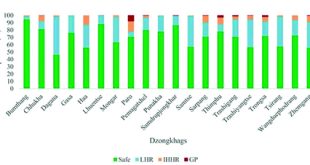On August 18, Tenzing Tshomo, a tour operator, was traveling back to Paro from Kathmandu carrying USD 1,200 in her purse inside her bag.
During her check-in at Tribhuvan International Airport, Kathmandu, as her luggage went through the X-ray machine, she said she overheard the officials operating it whisper excitedly in Nepali: “Paisa Raitsha, Paisa Raitsha” (“money is there, money is there”).
Instead of asking her to open her purse on the spot, she said an officer asked her to step aside and follow him to a more secluded area where several others were waiting to open her bag. She immediately sensed something was wrong and refused.
“It was shocking and frightening at the same time,” said Tenzing.
She insisted on remaining in view of the other passengers who had begun to gather around. She showed her money in public, and with the crowd watching, the officer let her go.
The incident, she said, left her feeling bitter and wondering how illiterate or vulnerable Bhutanese travelers would handle such situations.
“I’d like to request our policymakers to please raise the card limits so we don’t have to carry so much cash and become easy targets for thieves or corrupt officials,” Tenzing added.
She said she was fully aware of the legal limits for carrying cash through airports, and she was well within them.
When Tenzing shared her airport experience online, a Kathmandu resident and acquaintance of Tenzing, Prem Karthak Jimi said, “These people are part of the organized crime and shameless nexus that benefits all the way from the bottom up to the top minister level politicians. They use their uniform and power to do whatever necessary to loot extort innocent unknowing travellers in the name of the law. They are not afraid because they have powerful backups.”
Tenzing said this was not her first ordeal. Two years ago, when her son fell ill and needed treatment in Bangkok, she had approached a local bank and was assured the money would be released once she submitted the hospital invoice.
However, after reaching Bangkok and sending the invoice, she was suddenly told the bank could not transfer the money, with no clear explanation. She kept sending her staff to follow up, but the money never came. In a panic, she had to call her sister abroad, who finally sent the funds via Western Union to pay for her son’s treatment.
Her friend, Ugyen Tenzin, currently in Delhi for a family member’s treatment, echoed her concerns.
“Our government and banks should allow Bhutanese to deposit Ngultrums at home and access the equivalent abroad through cards,” he said. “Here in Delhi, hospitals only give invoices after consultations, tests, and requests from doctors. Until then, we have to cover accommodation, food, transport, and initial tests ourselves—costs that easily run into lakhs. But we are limited to only INR 25,000. How can that be enough?”
Currently, Bhutanese travelers to India are allowed INR 25,000 semi-annually, INR 100,000 for medical treatment (with documents), INR 80,000 for education, and ATM withdrawals of INR 15,000 per month. Debit card use is limited to INR 50,000 per month, and annual credit card use is capped at INR 150,000.
The problem is that these cards often don’t work reliably, while carrying cash is unsafe.
As a result, Ugyen said, many Bhutanese resort to stockpiling Indian Rupees in cash, which exposes them to theft or loss.
Tenzing said that a year and half ago, her friend traveled with her child to Singapore and had gone to eat in a restaurant that only accepts card payment. She ordered the food and it came, but the card was not working. She offered to some Singaporeans to pay them cash if they allowed her to use their card for paying for the food, however, the suspicious Singaporeans declined. Her food was taken away from the table in front of everyone.
Many Bhutanese complain that the foreign exchange limit of USD 3,000 per year is inadequate—only USD 2,000 is put on a card, while USD 1,000 is given in cash. The added problem is that the cards are not always reliable, often leaving travelers stranded or humiliated.
Tenzing said it is precisely because of these restrictions that many Bhutanese turn to the informal dollar market.
Another Bhutanese traveler, Pema Lhaden, recalled the case of a businesswoman who was murdered in Guwahati years ago while carrying a large amount of cash.
 The Bhutanese Leading the way.
The Bhutanese Leading the way.




